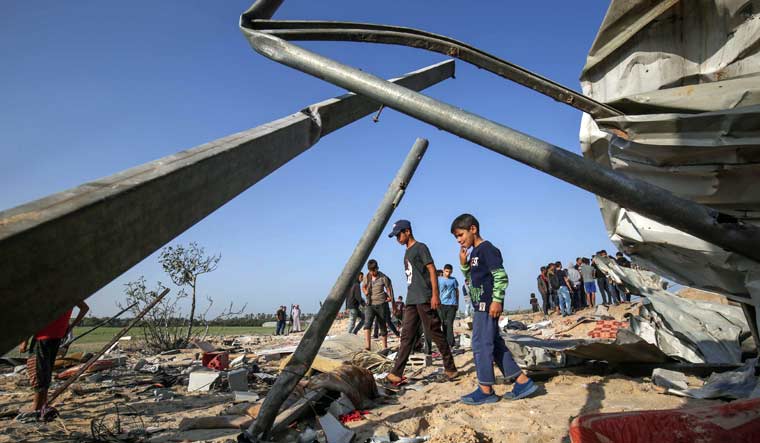Islamic Jihad spokesman Musab al-Berim said Gaza and Israel have entered into ceasefire at 5.30 am. The ceasefire was the result of an Egyptian-brokered deal. An Israeli military spokesman tweeted that the Gaza operation is over. Some restrictions were lifted on residents of southern Israel and traffic returned to the streets of the Palestinian coastal territory. Gaza seemed to be returning to normalcy too after Israeli military's Home Front command tweeted that it was lifting restrictions in certain areas but leaving them in place in the areas surrounding Gaza.
The cease-fire ended the heaviest Gaza fighting in months that killed at least 34 Palestinians and paralysed parts of Israel.
Eight family members of Abu Malhous, a senior military commander of the Islamic Jihad were killed among the 34 Gazans killed in the Israeli assault.
Al-Berim said the cease-fire was based on a list of demands presented by his group late Wednesday, including a halt to Israeli targeted killings of the group's leaders. Israeli military spokesman Lt. Col. Avichay Adraee did not confirm any such deal, listing only Israeli accomplishments in the fighting while Israel's Foreign Minister Israel Katz said targeted killings of militants would continue.
More than 400 rockets were fired at Israel by the Palestinian Islamic Jihad (PIJ) militant group after Israel killed a senior commander of the Iranian-backed militant group Baha Abu al-Ata, who was believed to be planning a cross-border infiltration according to Israelis.
Israel responded with scores of airstrikes.
Katz said everyone who was a top military official, who was set to carry out and was involved in terror or rocket firing against Israel was eliminated.
Life across southern Israel was crippled by rocket fire on Tuesday, also in the country's heartland in and around Tel Aviv. Nonstop air-raid sirens led to schools being cancelled and forced people to remain indoors.
Most rockets landed in open areas or were shot down by Israel's Iron Dome military defence system.
No vehicles were seen on Gaza roads on Tuesday except for ambulances evacuating the wounded.
The agreement, according to an Islamic Jihad official, stipulates that Palestinian factions must ensure a return to calm in Gaza and "maintain peace" during demonstrations, while Israel must stop hostilities and "ensure a ceasefire" during demonstrations by Palestinians.
Shortly after al-Berim's announcement, at least two rockets were fired out of Gaza, setting off sirens in southern Israel. Islamic Jihad said it was committed to ending the fight, but, firing might be likely because word hadn't spread to all members about the deal or the ceasefire.
Though Israel doesn't usually acknowledge deals with militant groups, UN and Islamic Jihad officials were in touch Wednesday with Egyptian mediators, who typically broker agreements to end fighting in Gaza and Israel did not respond to the rocket launch.
Israel often strikes Iranian interests in Syria and the fresh fighting— Tuesday's attack coincided with one Israel launched in Syria and targeted another Islamic Jihad commander— looked to awaken Israel's increasingly open conflict with Iran and its proxies in the region. Israel did not acknowledge the attack as the commander was not killed.
Iran supplies Islamic Jihad with training, expertise and money. As Iran's proxy in Gaza, the group is key to Tehran's strategy of keeping the pressure on Israel on all fronts.
Iran has forces based in Syria, Israel's northern neighbour, and supports Hezbollah militants in Lebanon. Hamas also receives some support from Iran.
The Gaza Strip has been under a joint Israeli-Egyptian blockade for more than a decade, where freedom of movement for the two million population has been severely curtailed.


